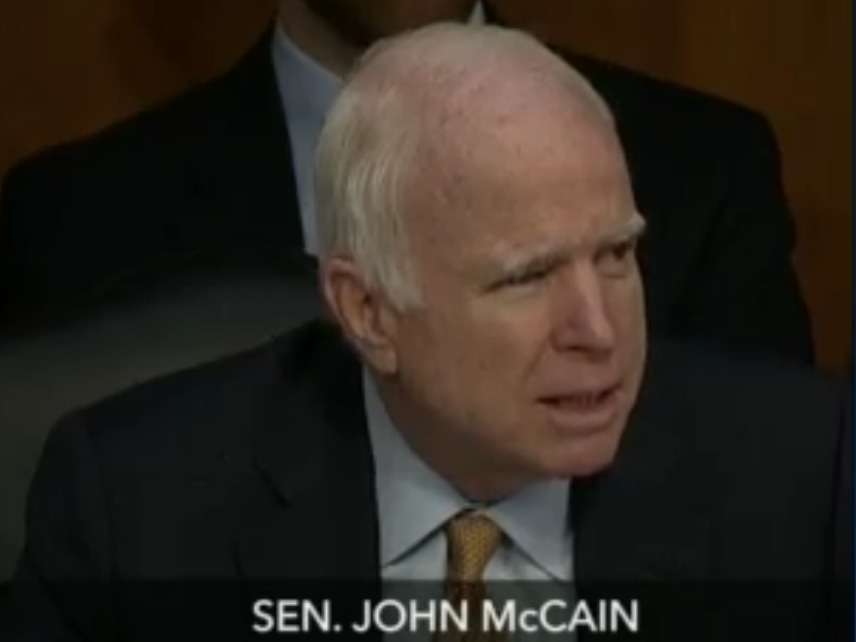What the Hell Was John McCain Trying to Say When He Questioned Comey?
In comparing Trump and Clinton, the senator apparently meant to highlight the distinction between impropriety and criminality.

"I'm a little confused," former FBI Director James Comey said while being questioned by Sen. John McCain (R-Ariz.) during his testimony before the Senate Intelligence Committee yesterday. Comey was not alone. Many people who watched the exchange or read the transcript were confused too. So was McCain, judging from his references to "President Comey" and his suggestion that the FBI had investigated Clinton for possible collaboration with Russian operatives who were trying to sink her presidential campaign. In a statement he issued after the hearing, the senator offered this explanation for his comments:
What I was trying to get at was whether Mr. Comey believes that any of his interactions with the President rise to the level of obstruction of justice. In the case of Secretary Clinton's emails, Mr. Comey was willing to step beyond his role as an investigator and state his belief about what "no reasonable prosecutor" would conclude about the evidence. I wanted Mr. Comey to apply the same approach to the key question surrounding his interactions with President Trump—whether or not the President's conduct constitutes obstruction of justice.
There is an instructive analogy here, although Comey's treatment of Clinton vs. Trump does not necessarily reflect a "double standard," as McCain suggested during the hearing. In Clinton's case, Comey concluded that her sloppy email practices as secretary of state did not justify prosecution because there was little evidence that she intentionally mishandled classified information. Although a charge based on "gross negligence" might have been feasible, he said, it would not have been just. "In our system of law, there's a thing called mens rea," Comey said, referring to the state of mind required for a conviction."We don't want to put people in jail unless we prove that they knew they were doing something they shouldn't do."
Applying that standard to Trump, it is not enough to know what he did; we also need to know his intent, which is the difference between impropriety and criminality. If we accept Comey's account (which certainly seems more trustworthy than Trump's), it is clear that the president acted inappropriately by demanding the FBI director's personal loyalty, asking him to drop the bureau's investigation of a former aide, and pressing him to publicly state that Trump himself was not under investigation. Trump's subsequent firing of Comey, although clearly within his authority as president, also looks suspect, especially since he eventually admitted that decision was related to his annoyance at the FBI's investigation of possible ties between his campaign and Russian meddling in the election. But whether Trump's behavior amounts to a crime depends on whether he acted "corruptly," meaning he had in mind the "improper purpose" of obstructing justice.
When Trump interceded on behalf of former National Security Adviser Michael Flynn, for example, was he trying to cover up crimes, or was he naively trying to help "a good guy" who in his view had been treated unfairly? Comey declined to speculate on Trump's state of mind, leaving that determination to Special Counsel Robert Mueller. "I don't think it's for me to say whether the conversation I had with the president was an effort to obstruct," he said. "I took it as a very disturbing thing, very concerning. But that's a conclusion I'm sure the special counsel will work towards, to try and understand what the intention was there, and whether that's an offense."
McCain seems to think that position is a cop-out: If Comey was prepared to conclude that Clinton did not intend to break the law, why can't he cut Trump the same slack? But as Comey pointed out, the FBI completed its investigation of Clinton's email practices before he announced his conclusions. By contrast, the investigation of Russian election meddling is ongoing, while Mueller's investigation of possible obstruction has barely begun. It is entirely possible that Mueller will turn up additional evidence that bears on the intent behind Trump's interactions with Comey, such as the president's contemporaneous conversations with other witnesses or his contacts with intelligence officials whom he reportedly enlisted to help clear the "cloud" generated by the Russia probe.
If McCain's post-hearing statement obscures the distinction between what Comey knew about Clinton's intentions and what we know about Trump's, his questions to Comey during the hearing blurred the situation beyond recognition. "You got one candidate who you're done with and another candidate that you have a long way to go [with]," he observed. "She's one of the candidates. But in her case, you say there will be no charges, and in the case of President Trump…the investigation continues." McCain seemed to conflate the Russia probe with the email investigation, saying "you made the announcement there would be no charges brought against then-Secretary Clinton for any activities involved in the Russia involvement in our—engagement in our election."
The 80-year-old senator attributed his puzzling performance to a lack of sleep. "I get the sense from Twitter that my line of questioning today went over people's heads," he said. "Maybe going forward I shouldn't stay up late watching the Diamondbacks night games."
Others blamed McCain's age. The Twitter response to which he alluded mixed mockery with sympathy. "John McCain is 80 years old and spent his 30s being tortured as a POW," said video game developer Brianna Wu, a Democrat who is running for Congress in Massachusetts. "If you're making fun of him, remember one day you'll be old too."


Show Comments (90)